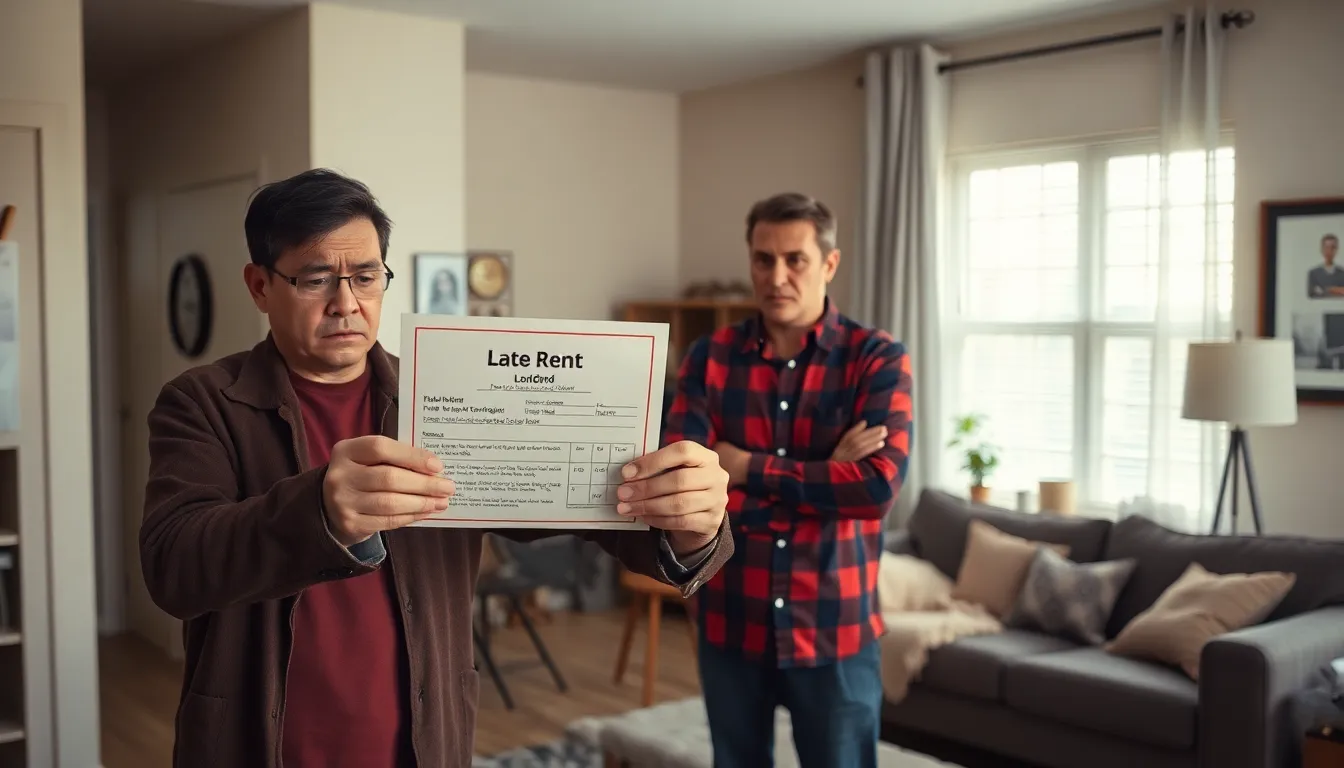Table of Contents
ToggleNavigating the world of landlord-tenant disputes can feel like stepping into a sitcom where everyone’s a little too dramatic. From late rent payments to noisy neighbors, these conflicts often escalate faster than a cat video going viral. But don’t worry; there’s a way to turn that chaos into calm.
Overview of Landlord Tenant Disputes
Landlord-tenant disputes arise from various issues. Late rent payments frequently cause friction. Noisy neighbors also create significant tensions. Other common problems include property maintenance disputes and security deposit disagreements. Understanding these conflicts helps in finding effective resolutions.
Mediation serves as one method to resolve disputes amicably. This process allows both parties to communicate their concerns directly. In some cases, arbitration provides a more formal structure, leading to binding decisions. Many jurisdictions require landlords and tenants to try resolving disputes through these means before pursuing legal action.
Actions taken by landlords contribute to disputes. Improper eviction processes lead to frustration for tenants. Failure to maintain properties often results in tenants withholding rent. Knowing tenants’ rights protects them from unethical practices.
Landlords also face challenges, such as property damage caused by tenants. Court interventions can resolve situations involving significant lease violations. Documenting issues accurately helps in any legal proceedings.
Specific laws govern landlord-tenant relationships. Each state has its own regulations, impacting how disputes are addressed. Consulting local rental laws provides clarity on rights and responsibilities. Legal resources are available to both parties seeking guidance.
Landlord-tenant disputes encompass a range of issues leading to conflicts. Awareness of conflict resolution methods and legal protections fosters more harmonious relationships. Engaging in proactive communication benefits both landlords and tenants.
Common Causes of Disputes

Landlord-tenant disputes arise from various issues. Understanding these common causes aids in addressing and resolving conflicts effectively.
Rent Issues
Late payments contribute to significant tensions. Tenants sometimes face unexpected financial challenges, leading to delays. Landlords expect timely rent, so unchecked delays can impact cash flow. Some disputes arise over lease terms regarding rent increases. Misunderstandings related to payment methods can lead to further disagreements. Documenting payment history helps clarify issues when conflicts occur.
Maintenance and Repairs
Failure to address maintenance requests often sparks disputes. Tenants expect landlords to maintain safe and habitable living conditions. Landlords might overlook urgent repairs due to oversight or financial constraints. Delays in necessary repairs can lead to property damage or health hazards. Open communication about maintenance responsibilities helps minimize these conflicts. Clearly defined repair timelines within lease agreements can also reduce misunderstandings.
Legal Framework
Landlord-tenant disputes often require an understanding of the legal framework governing these relationships. State and local laws play a crucial role in setting the standards for tenant and landlord interactions.
State and Local Laws
State and local laws dictate many aspects of landlord-tenant relationships. Regulations address security deposits, rent control, and eviction processes, varying significantly from one area to another. Legal statutes often outline requirements for lease agreements, including required disclosures and notice periods. In some jurisdictions, mediation may also be mandated before eviction actions are taken. Awareness of these laws helps both parties navigate disputes effectively and ensures compliance with local regulations.
Tenant Rights
Tenant rights serve as essential protections within rental agreements. Rights typically include the right to a habitable living environment, protection against illegal eviction, and privacy within the rental space. Local laws may also grant rights concerning the return of security deposits and the timing of repairs. Tenants can advocate for their rights by understanding these protections and utilizing them if issues arise. Knowledge of specific tenant protections empowers individuals and fosters more equitable rental relationships.
Landlord Responsibilities
Landlord responsibilities encompass obligations that ensure safe and reasonable living conditions. Responsibilities frequently include maintaining the property, addressing repair requests promptly, and respecting tenant privacy. Clear guidelines exist for handling tenant security deposits, as landlords must return them within specific timeframes unless deductions are justified. Educating landlords about their obligations encourages compliance and reduces the likelihood of disputes. Strong communication channels with tenants further enhance this relationship, promoting a cooperative living environment.
Resolution Methods
Effective resolution methods exist for landlord-tenant disputes. Utilizing negotiation and mediation often leads to mutually beneficial outcomes.
Negotiation and Mediation
Negotiation allows both parties to discuss issues directly, fostering open communication. Mediation involves a neutral third party to facilitate discussions, helping to clarify misunderstandings. Many jurisdictions require these approaches before resorting to legal action. Renting parties can reach agreements on various topics, such as rent payments or maintenance issues. Settlement terms can include payment plans or specific timelines for repairs. Both methods encourage cooperation, reducing lingering hostility and allowing tenants and landlords to maintain a working relationship.
Small Claims Court
Small claims court offers a formal legal option for disputes not resolved through negotiation or mediation. This avenue typically handles cases involving sums under a specific dollar limit, which varies by state, often around $5,000 to $10,000. Filing a case can lead to a hearing where both parties present evidence. The process remains less complex than higher courts, making it accessible for individuals without legal representation. Winning claims often result in monetary judgments that enforce compliance. Landlords and tenants both benefit from this structured yet straightforward approach to resolving conflicts.
Preventative Measures
Preventing landlord-tenant disputes requires proactive strategies. Implementing best practices early helps maintain harmonious relationships.
Clear Lease Agreements
Drafting clear lease agreements sets a strong foundation for both parties. Specific terms regarding rent, duration, and maintenance responsibilities avoid misunderstandings. Including clear clauses on late fees and security deposits eliminates confusion. Parties should review all terms together to ensure understanding. A well-structured agreement reduces the likelihood of disputes and provides enforceable guidelines. Clearly defined expectations create accountability for tenants and landlords alike. Revisions or updates to agreements should occur whenever necessary, ensuring current conditions reflect any changes.
Regular Communication
Establishing regular communication minimizes potential conflicts. Scheduling periodic check-ins allows landlords to address tenant concerns promptly. Tenants benefit from sharing their needs and any maintenance issues as they arise. Encouraging open dialogue fosters trust and transparency in the relationship. Responding promptly to inquiries demonstrates a commitment to a positive living experience. Regular updates regarding property changes or community rules keep tenants informed. When both parties feel heard, they are more likely to resolve issues amicably before they escalate into disputes.
Landlord-tenant disputes can be challenging but understanding the underlying issues and employing effective resolution strategies can lead to better outcomes. By fostering open communication and establishing clear lease agreements, both parties can minimize misunderstandings and prevent conflicts from escalating. Awareness of legal rights and responsibilities further empowers tenants and landlords alike, promoting a more cooperative living environment. Through proactive measures and a willingness to negotiate, it’s possible to transform disputes into opportunities for growth and improved relationships.








